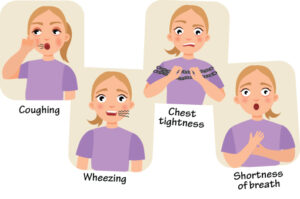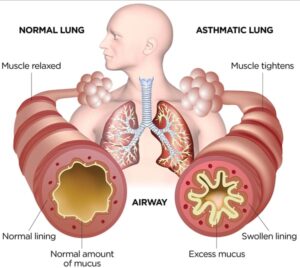
Asthma – Causes, Types, Diagnosis & it’s Homeopathic Management | HDS
Asthma is a chronic respiratory condition characterized by inflammation and narrowing of the airways in the lungs. It leads to a range of symptoms, including difficulty in breathing, wheezing, coughing, and chest tightness. These symptoms often occur in episodes or “asthma attacks” and can vary in severity, from mild to severe.

Here is a detailed overview of asthma:
Causes and Risk Factors: Asthma is a complex condition with multiple contributing factors. It often results from a combination of genetic and environmental factors.
Common risk factors :
• Allergens (e.g., pollen, dust mites, pet dander)
• Respiratory infections
• Irritants (e.g., tobacco smoke, air pollution, strong odors)
• Cold air or sudden weather changes
• Physical activity or exercise-induced asthma
• Occupational exposures (e.g., chemicals, fumes)
• Gastroesophageal reflux disease (GERD)

Pathophysiology:
In asthma, the airways become inflamed due to various factors, including immune responses to triggers and environmental stimuli. This inflammation leads to increased mucus production and swelling of the airway walls. Additionally, the muscles surrounding the airways can tighten (bronchoconstriction), causing the airways to narrow further. These changes result in reduced airflow and the characteristic symptoms of asthma.
Types of Asthma:
• Allergic Asthma: Triggered by allergens such as pollen, dust mites, and pet dander.
• Non-Allergic Asthma: Triggered by factors other than allergens, such as infections or exercise.
• Occupational Asthma: Caused by workplace exposures to irritants or allergens.
• Exercise-induced bronchoconstriction (EIB): Symptoms occur during or after physical activity.
Diagnosis:
Asthma diagnosis involves a combination of medical history, physical examination, and lung function tests. Common diagnostic tests include spirometry, which measures how well the lungs function, and peak flow measurements to assess airway obstruction.
Complications:
Poorly controlled asthma can lead to frequent exacerbations (flare-ups) and reduced lung function over time. Severe asthma attacks can be life-threatening and require immediate medical attention.
Homeopathic Management :
Arsenicum Album: This remedy is often used for individuals who experience anxiety, restlessness, and a sense of suffocation during asthma attacks. Symptoms may worsen at night, and the person may feel better with warmth.
Natrum Sulphuricum: It is indicated for asthma triggered by dampness, humidity, or mold exposure. Wheezing and difficulty breathing may be worse in the morning.
Ipecacuanha: This remedy is considered when there is persistent coughing, gagging, and nausea during asthma attacks. The person may have mucus in the airways that is difficult to expectorate.
Sambucus Nigra: This remedy is often used for sudden, spasmodic asthma attacks, especially in children. The person may wake up at night with a feeling of suffocation and have difficulty inhaling.
Blatta Orientalis: This remedy is used for asthma with a sensation of constriction in the chest, accompanied by a rattling sound in the chest during breathing.
Lobelia Inflata: It is indicated for asthma with a feeling of tightness and constriction in the chest. The person may have difficulty inhaling deeply.
Antimonium Tartaricum: This remedy is considered when there is excessive mucus in the airways, leading to a rattling cough and difficulty breathing.
Justicia Adhatoda: It is used for asthma with a suffocative sensation and a constant desire to take a deep breath. Coughing and wheezing may be present.
Grindelia Robusta: This remedy is often used for asthma with a feeling of constriction in the chest and difficulty exhaling.
Nux Vomica: It is considered when asthma is triggered by overexertion, stress, or digestive issues. The person may have a sensation of tightness in the chest.
Worked By: Sunitha Asir (Final BHMS)







